| Listing 1 - 10 of 12 | << page >> |
Sort by
|
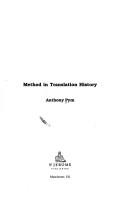
ISBN: 1900650126 9781900650120 Year: 1998 Publisher: Manchester St. Jerome Publishing
Abstract | Keywords | Export | Availability | Bookmark
 Loading...
Loading...Choose an application
- Reference Manager
- EndNote
- RefWorks (Direct export to RefWorks)
Starting from the critical notion that we should be asking questions of contemporary importance - and that 'importance' itself must be defined - Anthony Pym sets about undoing many of the currently dominant models of translation history, positing, among much else, that the object of this history should be translators as people, that researchers are subjectively involved in their object, that cultural systems are based on social will, that translators work in intercultural spaces, and that a model of cooperation through negotiation may be applied to the way translators (and researchers!) work between cultures. At the same time, the proposed methodology is eminently constructive, showing how many empirical techniques can be developed and applied: clear illustrations are given of corpus selection, working definitions, deceptive statistics, and the construction of networks and regimes, incorporating elaborate examples drawn from medieval and modernist fields, as well as finding space for notes on practical problems like funding research. Finding its focus in historical debates, this book cannot help but create contemporary debate: its arguments seek not only to revitalize the historical study of translation but also to develop the wider concerns of intercultural studies.
Translation science --- Historical linguistics --- Translating and interpreting --- History --- Philosophy. --- Methodology. --- Traduction --- Histoire --- Recherche --- 82.03 --- #KVHA:Vertaalhistorie --- Vertalen. Literaire vertaling --- Vertalen --- geschiedenis --- methodologie --- 82.03 Vertalen. Literaire vertaling --- methodologie. --- Traduction - Histoire --- Traduction - Recherche --- Traduction et interprétation --- Traduction et interpretation --- Méthodologie
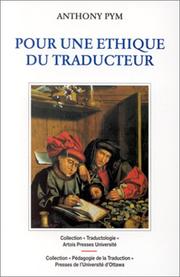
ISBN: 2910663159 2760304604 Year: 1997 Publisher: Arras Artois presses université
Abstract | Keywords | Export | Availability | Bookmark
 Loading...
Loading...Choose an application
- Reference Manager
- EndNote
- RefWorks (Direct export to RefWorks)
Translation science --- Professional ethics. Deontology --- Translating and interpreting --- Intercultural communication --- Translators --- Moral and ethical aspects. --- Professional ethics. --- -#KVHA:Vertaalwetenschap --- #KVHA:Vertaalethiek --- Interpretation and translation --- Interpreting and translating --- Language and languages --- Literature --- Translation and interpretation --- Moral and ethical aspects --- Translating --- Vertalen en ethiek --- Vertalen en ethiek. --- #KVHA:Vertaalwetenschap --- Traduction
Book
ISSN: 09297316 ISBN: 9789027224545 9789027272997 9027272999 9027224544 1283902303 Year: 2012 Volume: v. 104 Publisher: Amsterdam John Benjamins Publishing Company
Abstract | Keywords | Export | Availability | Bookmark
 Loading...
Loading...Choose an application
- Reference Manager
- EndNote
- RefWorks (Direct export to RefWorks)
This is about people, not texts - a translator ethics seeks to embrace the intercultural identity of the translatory subject, in its full array of possible actions. Based on seminars originally given at the Collège International de Philosophie in Paris, this translation from French has been fully revised by the author and extended to include critical commentaries on activist translation theory, non-professional translation, interventionist practices, and the impact of new translation technologies. The result takes the traditional discussion of ethics into the way mediators can actively create cooperation between cultures, while at the same time addressing very practical questions such as when one should translate or not translate, how much translators should charge, or whose side they should be on. On Translator Ethics offers a point of reference for the key debates in contemporary Translation Studies.
Translation science --- Professional ethics. Deontology --- Translating and interpreting --- Moral and ethical aspects --- Traducteurs --- Traduction --- Morale --- Moral and ethical aspects. --- Interpretation and translation --- Interpreting and translating --- Language and languages --- Literature --- Translation and interpretation --- Translators --- Translating --- Vertalen en ethiek --- Vertalen en ethiek. --- Traduction. --- Morale. --- Translating and interpreting - Moral and ethical aspects
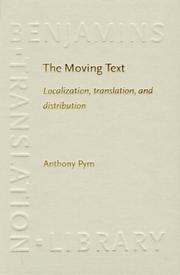
ISBN: 902721655X 1588115089 9786612160677 1282160672 9027295824 9789027295828 9789027216557 9781588115089 9781282160675 6612160675 Year: 2004 Publisher: Amsterdam John Benjamins Publishing Company
Abstract | Keywords | Export | Availability | Bookmark
 Loading...
Loading...Choose an application
- Reference Manager
- EndNote
- RefWorks (Direct export to RefWorks)
For the discourse of localization, translation is often "just a language problem". For translation theorists, localization introduces fancy words but nothing essentially new. Both views are probably right, but only to an extent. This book sets up a dialogue across those differences. Is there anything that translation theory can gain from localization? Can localization theory learn anything from the history and complexity of translation? To address those questions, both terms are placed within a more general frame, that of text transfer. Texts are distributed in time and space; localization and translation respond differently to those movements; their relative virtues are thus brought out on common ground. Anthony Pym here reviews not only key problems in translation theory, but also critical concepts such as cultural resistance, variable transaction costs, segmentation of the labour market, and the dehumanization of technical discourse. The book closes with a plea for the humanizing virtues of translation, over and above the efficiencies of localization.
Translation science --- Translating and interpreting --- Softwarelocalisatie. --- Vertalen en filosofie. --- Philosophy. --- #KVHA:Vertaalwetenschap --- Philosophy --- LANGUAGE ARTS & DISCIPLINES --- Translating & Interpreting --- Philology & Linguistics --- Languages & Literatures --- Traduction --- Translating and interpreting.
Book
ISBN: 9781900650250 190065024X 1900650258 9781315760025 9781317640912 9781317640929 9781900650243 Year: 2000 Publisher: Manchester St. Jerome Publishing
Abstract | Keywords | Export | Availability | Bookmark
 Loading...
Loading...Choose an application
- Reference Manager
- EndNote
- RefWorks (Direct export to RefWorks)
Spanish language --- Translating and interpreting --- Interculturele communicatie --- Spaanse taal --- Vertalen --- History. --- geschiedenis --- Spanje --- Spain --- Relations --- Interculturele communicatie. --- geschiedenis. --- #KVHA:Vertaalgeschiedenis; Spaans --- 82.03 --- 82.035 --- 82.03 Vertalen. Literaire vertaling --- Vertalen. Literaire vertaling --- 82.035 Literatuur. Algemene literatuurwetenschap--?.035 --- Literatuur. Algemene literatuurwetenschap--?.035 --- Interpretation and translation --- Interpreting and translating --- Language and languages --- Literature --- Translation and interpretation --- Translators --- History --- Translating --- Espanja --- Spanien --- Hiszpania --- Spanish State --- España --- Estado Español --- Espagne --- Hispania --- Sefarad --- Sepharad --- Shpanye --- Shpanie --- Reino de España --- Kingdom of Spain --- Reino d'Espanya --- Reinu d'España --- Espainiako Erresuma --- Regne d'Espanya --- Reiaume d'Espanha --- Espanya --- Espanha --- スペイン --- Supein --- イスパニア --- Isupania --- Relations. --- Translation science --- Historical linguistics --- Sociolinguistics
Book
ISBN: 9781474261104 1474261108 9781350058309 9781474261135 9781474261111 1474261132 1474261116 9781474261128 1474261124 1350058300 Year: 2017 Publisher: London Bloomsbury Academic
Abstract | Keywords | Export | Availability | Bookmark
 Loading...
Loading...Choose an application
- Reference Manager
- EndNote
- RefWorks (Direct export to RefWorks)
"Many 'translation solutions' (often called 'procedures,' 'techniques,' or 'strategies') have been proposed over the past 50 years or so in French, Chinese, Russian, Ukrainian, English, Spanish, German, Japanese, Italian, Czech, and Slovak. This book analyzes, criticizes and compares them, proposing a new list of solutions that can be used in training translators to work between many languages. The book also traces out an entirely new history of contemporary translation studies, showing for example how the Russian tradition was adapted in China, how the impact of transformational linguistics was resisted, and how scholarship has developed an intercultural metalanguage over and above the concerns of specific national languages. The book reveals the intensely political nature of translation theory, even in its most apparently technical aspects. The lists were used to advance the agendas of not just linguistic nationalisms but also state regimes - this is a history in which Hitler, Stalin, and Mao all played roles, Communist propaganda and imperialist evangelism were both legitimized, Ukrainian advances in translation theory were forcefully silenced in the 1930s, the Cold War both stimulated the application of transformational grammar and blocked news of Russian translation theory, French translation theory was conscripted into the agenda of Japanese exceptionalism, and much else."--Bloomsbury Publishing.
Translating services --- Translating and interpreting. --- Vertaalwetenschap --- Vertaalkunde --- Vertalen en politiek --- Vertaalprocedures --- Vertalen en cultuur --- Vertalen --- Translating services. --- Translating and interpreting --- geschiedenis --- sociale aspecten --- Study and teaching. --- Study and teaching --- Vertaalwetenschap. --- Vertaalkunde. --- Vertalen en politiek. --- Vertalen en cultuur. --- geschiedenis. --- sociale aspecten. --- Interpretation and translation --- Interpreting and translating --- Language and languages --- Literature --- Translation and interpretation --- Translators --- Translating agencies --- Translation bureaus --- Bibliographical services --- Language services --- Translating --- Translation science --- Interpreting services --- Translation and interpreting services --- Translation services --- Translating and interpreting - Study and teaching
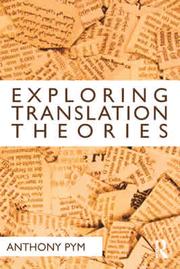
ISBN: 9780415553636 020386929X 9780203869291 9780415553629 0415553636 0415553628 Year: 2010 Publisher: London : Routledge,
Abstract | Keywords | Export | Availability | Bookmark
 Loading...
Loading...Choose an application
- Reference Manager
- EndNote
- RefWorks (Direct export to RefWorks)
Presents a comprehensive analysis of key traditional and contemporary paradigms of translation theory. This book includes examples from a range of languages and various tasks and activities.
Translating and interpreting. --- #KVHA:Vertaaltheorie --- Vertaaltheorie --- Vertaaltheorie. --- 800.73 --- #KVHA:Vertaalwetenschap --- 800.73 Tweetaligheid. Meertaligheid. Vreemde talen. Vertalen --- Tweetaligheid. Meertaligheid. Vreemde talen. Vertalen --- Vertaalkunde. --- geschiedenis. --- Translating and interpreting --- Interpretation and translation --- Interpreting and translating --- Language and languages --- Literature --- Translation and interpretation --- Translators --- Translating --- Interpreting --- Translation science --- tolken --- Geschiedenis. --- Traduction
Book
ISBN: 9788461316199 9788461188215 9788461316205 9788461477715 9788469530504 846953050X 8469596926 9788469596920 Year: 2012 Publisher: Tarragona : Universitat Rovira i Vrigili. Intercultural Studies Group,
Abstract | Keywords | Export | Availability | Bookmark
 Loading...
Loading...Choose an application
- Reference Manager
- EndNote
- RefWorks (Direct export to RefWorks)
This volume presents texts from the graduate conference New Research in Translation and Interpreting Studies held in Tarragona in 2011.
Vertaalkunde --- #KVHA:Vertaalwetenschap --- #KVHA:Translation research --- Traduction et interprétation
Book
ISBN: 3030200981 303020099X Year: 2019 Publisher: Cham : Springer International Publishing : Imprint: Palgrave Pivot,
Abstract | Keywords | Export | Availability | Bookmark
 Loading...
Loading...Choose an application
- Reference Manager
- EndNote
- RefWorks (Direct export to RefWorks)
"Without trust, the translation profession would collapse, and so would its practice. This innovative volume shows that trust is a wonderfully rich and revealing prism through which to study the history of both the practice and the profession." -- Andrea Chesterman, University of Helsinki, Finland "[This book] builds bridges between historians and translation scholars by theorizing translation in terms historians will understand and theorizing history in terms translation scholars will understand." -- Douglas Robinson, Hong Kong Baptist University This book presents a dynamic history of the ways in which translators are trusted and distrusted. Working from this premise, the authors develop an approach to translation that speaks to historians of literature, language, culture, society, science, translation and interpreting. By examining theories of trust from sociological, philosophical, and historical studies, and with reference to interdisciplinarity, the authors outline a methodology for approaching translation history and intercultural mediation from three discrete, concurrent perspectives on trust and translation: the interpersonal, the institutional and the regime-enacted. This book will be of particular interest to students and scholars of translation studies, as well as historians working on mediation and cultural transfer. Andrea Rizzi is a Cassamarca Associate Professor of Italian Studies and Australian Research Council Future Fellow at the University of Melbourne, Australia. Birgit Lang is Associate Professor of German Studies at the University of Melbourne, Australia. Anthony Pym is Professor of Translation Studies at the University of Melbourne, Australia, Distinguished Professor of Translation and Intercultural Studies at the Universitat Rovira i Virgili, Spain, and Professor Extraordinary at the University of Stellenbosch, South Africa.
Translating and interpreting. --- Literature-Translations. --- Literature-History and criticism. --- Social history. --- Culture-Study and teaching. --- Translation. --- Translation Studies. --- Literary History. --- Social History. --- Cultural Theory. --- Descriptive sociology --- Social conditions --- Social history --- History --- Sociology --- Interpretation and translation --- Interpreting and translating --- Language and languages --- Literature --- Translation and interpretation --- Translators --- Translating --- Translation and interpretation. --- Literature—Translations. --- Literature—History and criticism. --- Culture—Study and teaching.
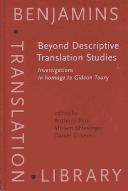
ISBN: 9789027216847 9027216843 9786612152337 1282152335 9027291675 9789027291677 9781282152335 6612152338 Year: 2008 Volume: 75 Publisher: Amsterdam John Benjamins Publishing Company
Abstract | Keywords | Export | Availability | Bookmark
 Loading...
Loading...Choose an application
- Reference Manager
- EndNote
- RefWorks (Direct export to RefWorks)
To go "beyond" the work of a leading intellectual is rarely an unambiguous tribute. However, when Gideon Toury founded Descriptive Translation Studies as a research-based discipline, he laid down precisely that intellectual challenge: not just to describe translation, but to explain it through reference to wider relations. That call offers at once a common base, an open and multidirectional ambition, and many good reasons for unambiguous tribute. The authors brought together in this volume include key players in Translation Studies who have responded to Toury's challenge in one way or another. Their diverse contributions address issues such as the sociology of translators, contemporary changes in intercultural relations, the fundamental problem of defining translations, the nature of explanation, and case studies including pseudotranslation in Renaissance Italy, Sherlock Holmes in Turkey, and the coffee-and-sugar economy in Brazil. All acknowledge Translation Studies as a research-based space for conceptual coherence and creativity; all seek to explain as well as describe. In this sense, we believe that Toury's call has been answered beyond expectations.
Traduction --- --Translating and interpreting --- Translating and interpreting. --- Vertaalkunde. --- Vertaalwetenschap. --- Theory of literary translation --- Translation science --- Sociolinguistics --- 82.03 --- 82.035 --- #KVHA:Beschrijvende vertaalwetenschap --- #KVHA:Toury, Gideon --- 82.03 Vertalen. Literaire vertaling --- Vertalen. Literaire vertaling --- Literatuur. Algemene literatuurwetenschap. Vertalen --- Festschrift - Libri Amicorum --- Traduction et interprétation --- Translating and interpreting --- Interpretation and translation --- Interpreting and translating --- Language and languages --- Literature --- Translation and interpretation --- Translators --- Translating --- Toury, Gideon.
| Listing 1 - 10 of 12 | << page >> |
Sort by
|

 Search
Search Feedback
Feedback About UniCat
About UniCat  Help
Help News
News